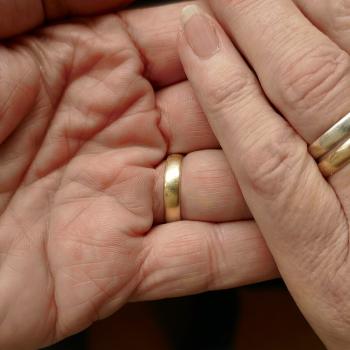![Hendrick ter Brugghen [Public domain], via Wikimedia Commons The Calling of St. Matthew by Hendrick ter Bruggen](https://upload.wikimedia.org/wikipedia/commons/d/de/Brugghen%2C_Hendrick_ter_-_The_Calling_of_St._Matthew_-_1621.jpg)
A longtime colleague of mine, who is gay, thinks I hate him. We’ve always gotten along fine, but now that our state is considering legalizing same-sex unions, he’s convinced my opposition to that law must be fueled by hatred. How do I convince him I don’t hate him?
I’ve changed the details to protect the privacy of the friend who asked, but it’s a question many Catholics are facing these days. The hierarchy of sin and public opinion goes something like this:
If you think masturbation is a sin, you’re unrealistic.
If you think fornication is a sin, you’re a prude.
If you think contraception is a sin, you’re a nutcase.
If you think homosexual acts are a sin, you’re a hater.
Any evidence that you may give to the contrary, such as being kind, respectful, and friendly towards the person in question, is just proof you’re a two-faced hater. At least the people who sneer and fling insults are open about their hate.
The Secretary of Forgiveness
Way back at my first job after graduate school, I forgot one week to turn in a form to the departmental administrative assistant. The form annoyed me, so I’d put it off. She came around asking for it. I started making excuses for why I was justified in turning it in late.
“I forgive you, I just need the form.”
I made some more excuses.
“I forgive you.”
I was good at coming up with excuses, so I tossed out a couple more.
She grabbed me by the shoulders, as only an exasperated mother can. “Jennifer. I. Forgive. You. I just need the form.”
This was inconceivable to me. The only type of “forgiveness” I understood was the you didn’t do anything wrong or the it was an honest mistake. The notion that I could have possibly done something wrong and not been condemned for it was utterly foreign to me.
Now I hadn’t lived a sinless life to that point, see: “good at making excuses” above. But since I couldn’t live with myself if knew I’d done something wrong, I habitually convinced myself I was always right, or that it didn’t matter anyway. To this day, it is difficult for me to believe that I can admit I did something wrong and people won’t condemn me for it.
The Condemnation Culture
Want to give up TV fast? Forget worrying about foul language or sex scenes. Try watching only programs that glorify kindness, respect, and forgiveness. Insult-flinging is the new blood sport. There are whole genres that consist of nothing but showing people how terribly, terribly wrong they are, and thus deserving of mockery.
Is it any wonder that people suspect you hate them if you think they are seriously sinning, when they already have reason to think you despise them just for being unfashionable? How many times have I heard the same exact person spout the virtues of “being your own person,” and then turn around and snicker at so-and-so who commits the unpardonable sin of “not fitting in”?
When the accusations of you must hate me start flying, I suspect it means one of four things:
1. I hate you for opposing me. You’re in my way. Sociopaths happen.
2. I’ve run into people who share your beliefs on moral issues and who also treat me hatefully, so I assume you’re more of the same.
Be frank, Christians: You’ve met haters at your church. The red flag is the dividing of the sin-list into the sins that really count, and the sins that aren’t really sins at all . . . always conveniently lumped so that the hater ends up on the winning side.
3. I’m just like those haters at your church, except I split my sins differently. Christians have no monopoly on the sin of pride. It’s an equal-opportunity infecter.
4. It is inconceivable to me that I could do something wrong and still be loveable.
Category 1 haters you can’t do anything about. It’s not about love, it’s about power and control. Fear and obey, or face the consequences.
Categories 2 is an honest mistake. People learn from experience. In the short term, your friend is going to assume the worst about you. In the long term, kindness and respect are healing. Let the insults fall where they may, and keep your Catholic on.
Category 3 & 4 are two sides of the same coin. Legalism, as the term gets thrown around, is the idea that we can be justified on our own merits. That we can be good enough. And indeed, that we must be good enough or we will be condemned. If love has to be earned by good behavior, it becomes imperative that everything we do be acceptable. Approval becomes the knife’s edge on which human worth balances.
The Gospel is Radically Different
The Good News isn’t, “You are just fine the way you are.” That’s not good news, just ask anyone who’s borne the brunt of my sins. The last thing we need is for Jennifer to get a free pass to keep carrying on the way she does.
The Good News is this: Even though you sin, you are loveable. You are worth keeping. You’re worth cleaning up, too. That’s something you can work on bit by bit until, by the grace of God, you’re finally fit to be around all the time, not just after you’ve had enough coffee. God wants you so desperately that He’s borne unspeakable suffering to rescue you from not just the sins you hate, but the ones you don’t even yet realize you’re committing.
I’ve known people for whom the old trope hate the sinner love the sin* “love the sinner hate the sin” is really just code for, “Wow. I’ve never met someone quite so pathetic as you.” That’s not Christianity. Christianity is the old playground comeback applied one sinner to another: Takes one to know one.
*Thank you John C. Hathaway for catching the typo.
















